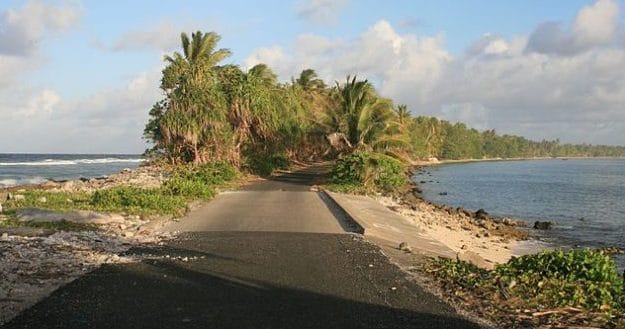Ever wondered what life is like in one of the smallest and most remote countries on Earth? Tuvalu, a tiny island nation in the South Pacific, might be small in size but it’s huge in character and unique experiences. Its nine islands are scattered far from major landmasses, making it a truly isolated gem.
With fewer than 12,000 residents, Tuvalu offers a glimpse into a life deeply connected to the ocean and ancient traditions, yet facing modern challenges like rising sea levels. Despite its beauty, life here isn’t always a paradise. Let’s dive into 10 captivating facts about this incredible nation, revealing what it’s truly like to call Tuvalu home.
10. Tuvalu is Incredibly Small
It’s hard to picture just how tiny Tuvalu is. If you’ve flown from Hawaii to Australia, you’ve passed right over it, likely without noticing. The combined landmass of its nine islands is a mere 10 square miles (26 square kilometers). That’s about one-tenth the size of Washington, D.C., spread across a vast expanse of the Pacific Ocean!
These islands are coral atolls, meaning none of them rise very high above sea level. Funafuti, the capital, hosts about half of Tuvalu’s population, around 6,000 people. It’s far from a bustling city. The highest point on the island is only about 30 feet (9.1 meters) above the sea. This low elevation presents significant challenges, especially with limited land for farming and a reliance on rainwater collection and desalination for fresh water.
9. Ancient Migrations Formed Modern Tuvaluans
So, how did people find their way to these remote atolls? The story begins around 800 years ago when Samoans sailed northwest, settling many of Tuvalu’s islands. Later, people from Tonga and Micronesia arrived, establishing communities on the other atolls. For centuries, these settlers lived in relative peace and isolation.
Europeans first arrived in the mid-16th century with Spanish explorer Álvaro de Mendaña de Neira. However, it wasn’t until the mid-1800s that Western contact became more frequent and, tragically, exploitative. The 19th century saw Tuvalu become a target for the “blackbirding” trade, where men were deceitfully lured or kidnapped onto European ships and forced into labor on distant plantations. This horrific practice drastically reduced the islands’ population. In 1892, Great Britain declared the islands a protectorate, naming them the Ellice Islands and administratively linking them with the Gilbert Islands (modern-day Kiribati). This caused tension due to cultural differences. Tuvalu eventually gained independence in 1978.
8. Tuvalu’s Unique Local Economy and a Surprising Income Source
Making a living in Tuvalu primarily revolves around local means. Many Tuvaluans are subsistence farmers, tending to personal gardens, or fishermen. Due to limited land and challenging farming conditions, large-scale agriculture isn’t feasible. About a tenth of the population works overseas, often on merchant ships or in Nauru’s phosphate mines, sending money back home.
Tuvalu imports most of its necessities like food, fuel, and dry goods from countries like Australia, New Zealand, Fiji, and Japan. This dependency is a concern, but there’s a fascinating twist. When the internet began, Tuvalu was assigned the country code top-level domain (ccTLD) “.tv”. This has become an unexpected goldmine! Companies worldwide, especially in the television and streaming industries (like Twitch), pay significant fees for .tv domain names. This revenue is vital, helping the government fund essential services like education, healthcare, and infrastructure.
7. Money Matters: Challenges and a Digital Future?
Financial systems in Tuvalu are quite different from what many of us are used to. There’s no central bank controlling monetary policy. The National Bank of Tuvalu, partly government-owned, is the only bank and primarily acts as a deposit center. Interestingly, Tuvalu doesn’t have its own currency; it uses the Australian dollar. This provides some stability but also means no local control over currency supply.
You won’t find any ATMs on the islands, and digital banking is virtually non-existent. Cash is king. This can lead to cash shortages, especially since many Tuvaluans working abroad take their earnings with them. To address these challenges and modernize, Tuvalu is exploring innovative solutions, including the potential role of cryptocurrency. A move to a digital currency could help stabilize cash flow and reduce dependence on foreign aid.
6. Te Ano: Tuvalu’s Unique National Sport
Sports are a big deal in Tuvalu, just like anywhere else! After the British influence, cricket became popular, leading to a local version called kilikiti, which was the nation’s favorite for decades. Soccer has since gained immense popularity, and Tuvalu even fields a national team for international events.
But there’s another game you’ve likely never heard of: Te Ano. This unique sport is a captivating blend of volleyball, cricket, and even baseball. Two teams face off, each with a captain and a catcher. The captain throws a ball made of pandanus leaves (the “ano”) to the opposing team. They bat it back, and the fielding team, the “vaka,” must hit it amongst themselves by hand, aiming to return it to their catcher without it touching the ground. Points are scored if the ball drops or if it’s successfully returned. It’s a fast-paced, exciting game, even taught to Prince William during his 2012 visit!
5. Limited Agriculture and Its Impact
Finding reliable food sources is a constant challenge in Tuvalu. While the ocean provides fish, fishing is labor-intensive, can be dangerous, and catches aren’t guaranteed. Land-based agriculture is severely limited by the sandy, salty, and shallow topsoil. Crops like coconut, breadfruit, taro, and bananas do grow, along with the prized local root crop, pulaka. Farmers also raise some pigs and chickens, but on a very small scale.
Rising sea levels are further threatening traditional crops, particularly pulaka. This agricultural vulnerability forces Tuvalu to import most of its food. Unfortunately, much of this imported food is processed and packaged, contributing to a growing public health issue: obesity. Over half of Tuvaluan adults are now overweight, and diabetes risk is high. This is a challenge shared with many other Polynesian nations, and leaders are actively seeking solutions.
4. Music and Dance: The Heartbeat of the Islands
Tuvaluans have a deep love for music and dance. Traditional songs often tell stories of love, historical events, and nature, though interestingly, themes of death are typically avoided. Singers are highly respected, a testament to cultural influences from ancient Polynesian migrants and Christian missionaries who both valued the power of song.
Dance is equally important, with the traditional two-step known as the “fatele.” Uniquely, this dance was traditionally performed while sitting or kneeling, with performers using intricate arm and hand movements. As a chorus chants and sings, dancers move in a simple yet captivating display. Today, the fatele has evolved, with modern Tuvaluans incorporating footwork, making it an even more elaborate ritual. It’s a vibrant expression of their culture, even shared with royalty like Prince William and Princess Catherine during their visit.
3. Family: The Core of Tuvaluan Society
In a place as small as Tuvalu, community and family are everything. It often feels like everyone knows each other, especially in Funafuti. Households are typically extended clans, often with three generations—parents, children, and grandchildren—living together. Grandparents play a key role in caring for the young ones, while parents handle work, farming, fishing, and household chores.
Elders are deeply respected, and major family decisions are made only after consulting the oldest members. Gender roles tend to be traditional, with women often managing domestic duties and men providing for the family through outdoor work. Traditional homes, called “fale,” are open-sided structures built with coconut tree stumps and thatched pandanus leaf roofs, allowing for a breezy, communal lifestyle. While modern, Western-style homes are becoming more common for their resilience against cyclones, the strong family bonds remain central to Tuvaluan life.
2. The Ever-Present Threat of Climate Change
Tuvalu’s very existence is threatened by climate change. The phrase “Tuvalu is sinking” is a grim reality for its residents as rising sea levels encroach on their limited land. Sandy beaches are disappearing, and with nowhere to retreat, the situation is dire. This environmental crisis has cascading effects: freshwater sources are contaminated by saltwater intrusion, crop yields decline, and traditional fishing grounds are altered.
The nation relies heavily on foreign aid to cope, and permanent solutions like evacuation are considered, though it’s a heartbreaking last resort for a people deeply connected to their ancestral lands. Fiji has generously offered land for relocation, but Tuvalu continues to fight for its home. The country is committed to green energy, aiming to convert to 100% renewable power sources. Their efforts, like installing solar panels, are a powerful symbol of resilience and a call for global action on climate change.
1. A Unique Political System: No Parties!
Despite its many challenges, Tuvalu has a rather unique approach to politics: there are no formal political parties! Their government is a unicameral parliament with 15 members, re-elected every four years by the citizens. This parliament then elects a Prime Minister and a Cabinet. The absence of political parties means that politics are based on individual leaders’ perspectives, personalities, and informal alliances that can shift depending on the issue.
Consensus and compromise are highly valued in Tuvalu’s political culture, reflecting historical community success. Governing such a small, tight-knit population naturally encourages cooperation. However, traditional gender roles have led to an underrepresentation of women in politics, an issue many hope will improve as Tuvaluan society continues to modernize. For now, its leaders work together to navigate the serious challenges facing this beautiful island nation.
Life in Tuvalu is a blend of ancient traditions, strong community bonds, and pressing modern challenges. It’s a testament to human resilience and adaptation in one of the most unique corners of our world.
What fact about Tuvalu surprised you the most? Share your thoughts in the comments below!










